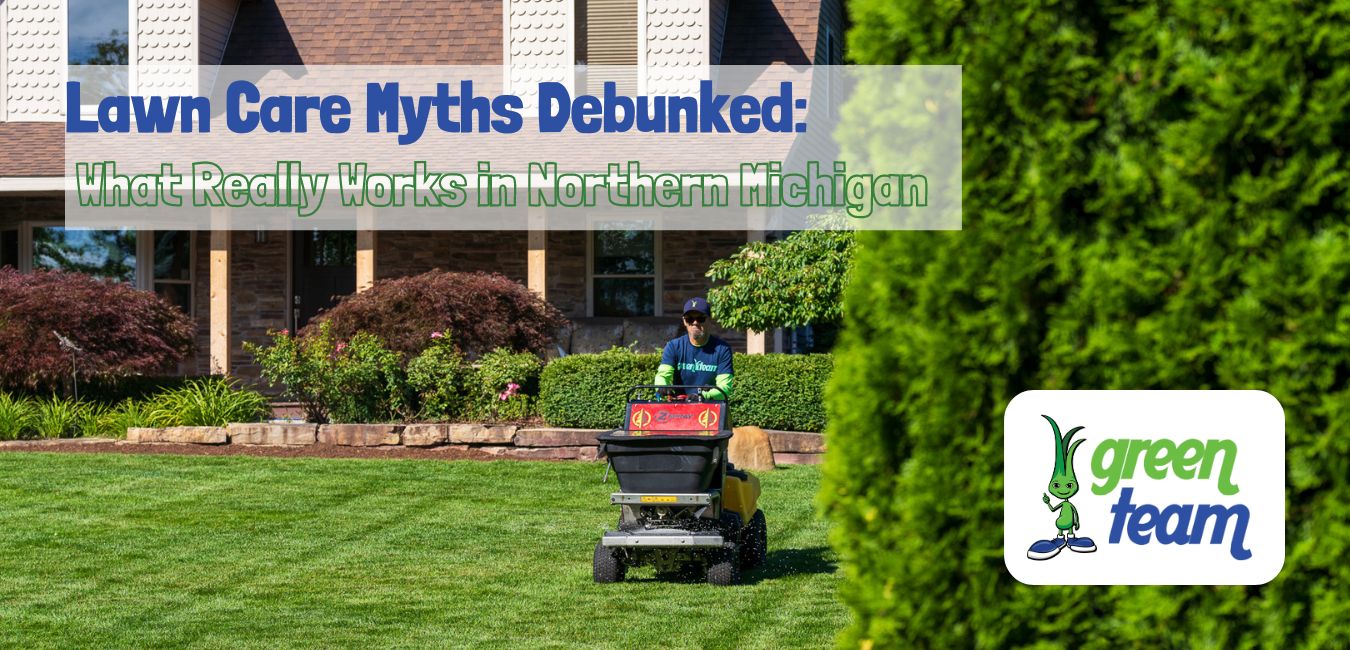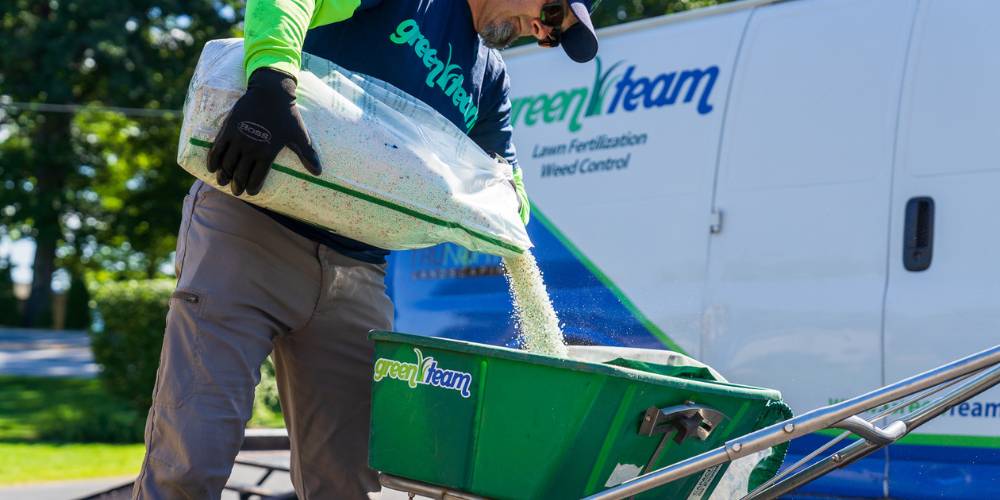
Lawn Care Myths Debunked: What Really Works in Northern Michigan
Let’s face it, maintaining a lush, green lawn in Northern Michigan can sometimes feel like solving a complex puzzle. Between the unpredictable weather and the myriad of lawn care advice floating around, it’s easy to get caught up in common misconceptions.
We’ve heard those lawn care tips that promise the world but often deliver less-than-stellar results. Let’s set the record straight and debunk some of the most problematic lawn care myths that might be holding you back from achieving your perfect yard.
Myth 1: The More Fertilizer the Better
Applying too much fertilizer is not just unnecessary, it can be harmful to your grass and to the environment. Over-fertilizing your grass can actually result in your lawn dying instead of growing more lush. Excess fertilizer can cause a build-up in your soil as well, leading to what is known as fertilizer burn. This condition damages the roots of the grass, making it difficult for them to absorb water and nutrients effectively. As a result, the grass can turn yellow or brown, become weak, and eventually die.
Additionally, over-fertilization can significantly negatively impact the environment. Excess nutrients, particularly nitrogen and phosphorous, can leach into groundwater or run off into our nearby bodies of fresh water during rainfall. This can contribute to the development of harmful algae blooms in our lakes and rivers, which deplete oxygen levels in the water and harm aquatic life. Furthermore, nitrogen oxides released from excess fertilizer can contribute to air pollution and greenhouse gas emissions.
To avoid these issues, it is crucial to follow recommended fertilization schedules and apply the appropriate amount of fertilizer for your specific type of grass and soil conditions. Professionals are trained and licensed to apply any chemical treatments to your lawn to prevent these issues.

Myth 2: The Rain Provides My Lawn with Enough Water
While we do receive a significant amount of rain in Northern Michigan, it is not enough to sustain your lawn. During the summer, high temperatures and increased sunlight cause water to evaporate quickly from the soil, making it difficult for grass to retain the necessary moisture. While summer rain showers can be sporadic and heavy, they often do not provide consistent and deep watering needed for healthy grass growth.
This inconsistency can result in the grassroots remaining shallow, as they do not develop the depth needed to access water during dry periods. Lawns then become stressed, exhibiting signs of drought such as wilting, discoloration, and thinning. The stress weakens the grass, making it more susceptible to weed invasions, disease, pests, and other damage.
To maintain a healthy lawn, it is essential to supplement rainfall with regular, deep watering that ensures moisture reaches the root zone, promoting robust root development and resilience against summer heat. Consider installing a smart irrigation system that can be programmed, so you don’t have to worry about turning on and off your system daily.

Myth 3: I Only Need to Fertilizer in the Summer
While summer fertilization application is important, the early Spring application and final Fall application are actually the most important for your lawn’s health. Early Spring fertilizer applications typically include pre-emergent weed control components, which help battle perennial weeds like crabgrass, which are difficult to defeat after being established. This application also gives your lawn much-needed nutrients to bounce back from dormancy.
The Fall fertilizer application is equally critical because it helps prepare your lawn for the harsh winter months and sets the stage for a strong start the following Spring. During the Fall, grassroots enter a period of active growth, even though the top growth slows. Applying the right fertilizer at this time provides essential nutrients that strengthen the roots and increase their reserves.
Most experts recommend fertilizing five times during the growing season.

Myth 4: There is No Way to Prevent Weeds
While some weeds are extremely difficult to eliminate, there are preventative measures you can take to battle weeds. Be sure to apply fertilizer in the early Spring that includes a pre-emergent component. This type of fertilizer helps prevent weed seeds from germinating, effectively reducing the number of weeds that can establish themselves in your lawn. Pre-emergent herbicides create a barrier in the soil, targeting weeds like crabgrass and dandelions before they have a chance to sprout.
In addition to pre-emergent fertilization, maintaining a healthy, thick lawn can naturally suppress weed growth. Weeds thrive in bare or thin spots where they face less competition from grass. Regular mowing at the proper height, appropriate watering, and aeration with overseeding can help ensure your grass is dense and resilient, outcompeting potential weeds.

Myth 5: Cutting My Grass Shorter Helps Reduce the Need for Mowing
While cutting your grass shorter my mean you have to mow less often, the practice can actually be extremely detrimental to both the health and appearance of your lawn. Cutting grass too short, known as scalping, can weaken the grass and expose it to various problems, like stress on the grass, shallow root systems, increased weed growth, higher susceptibility to pests and diseases, and soil erosion.
Knowing the best way to mow your lawn can be difficult, which is why we wrote an entire blog about it. Be sure to avoid cutting more than one-third of the grass blade length at a time, adjust mowing height seasonally, and keep your mower blades sharp.

Myth 6: DIY Lawn Care is Just as Effective as Professional Lawn Care Services
While you may be able to be successful in caring for your lawn, it does require a significant amount of time, materials, and equipment, which is why it is often more effective to hire professional services. Professional lawn care providers bring a wealth of knowledge, specialized equipment, and experience that most DIY enthusiasts can simply not match.
For instance, professionals are required to be licensed in order to apply anything to your lawn. In order to keep their certification, they must take continuing education classes each year. Professionals also have access to high-quality products and advanced techniques that are not always available to the average homeowner.
DIY lawn care typically involves a trial-and-error approach that can lead to inconsistent results, wasted time, and even potential damage to your lawn.

Caring for Your Lawn in Grand Traverse and Leelanau County, MI
Navigating the world of lawn care can feel overwhelming, especially with so much conflicting information out there. By debunking these common myths, we hope to provide you with the knowledge needed to make informed decisions about your lawn care routine.
Remember, a healthy, vibrant lawn in Northern Michigan requires a balanced approach, from proper fertilization and watering techniques to strategic mowing and weed prevention. If you choose to enlist the help of professionals to improve the look and health of your turf, we hope you will consider the experts here at Green Team!
Ready for some help achieving a healthier and more beautiful lawn? Contact us at Green Team Lawn care today!

Stay in “the know”! Sign up for our free quarterly newsletter to learn tips & tricks for maintaining the perfect yard.
We take your personal information very seriously. We will not share any of the information you provide with any 3rd parties. Provided information will be used specifically to contact you in regards to your inquiry.
Get Started Today
– 1 –
Give us a call or get started by filling out our contact form
– 2 –
Talk with one of our professionals about a plan that works best for you
– 3 –
Sit back and relax. The Green Team will come out swinging



